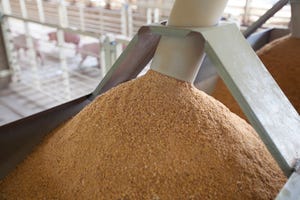USDA has a review process in place for genetic editing in plants under its Animal and Plant Health Inspection Service, which can easily be adopted for livestock.
March 12, 2020

Thanks to innovation and continuous improvements, U.S. hog farmers are the world's leading suppliers of high-quality, safe and affordable pork. However, America is in danger of losing its leadership standing due to significant flaws in its current approach to regulating emerging animal breeding technologies, Iowa Pork Producers President Michael Paustian testified this morning before the Senate Agriculture Committee. Oversight should be under the USDA, not the Food and Drug Administration.
Gene editing technology, which allows for precise changes within an animal's own genome, offers tremendous promise to combat animal disease while producing safe food in a more sustainable fashion. "Livestock producers need access to these technologies. While countries like China, Canada, Brazil and Argentina are moving quickly to gain a competitive advantage in the market, the U.S. is falling behind," says Paustian, a hog farmer from Walcott, Iowa, testifying on behalf of the National Pork Producers Council.
Despite no statutory requirement, the FDA currently claims regulatory authority over gene editing in food-producing animals. FDA oversight will treat any gene-edited animal as a living animal drug — and every farm raising them a drug manufacturing facility. Under FDA regulation, gene editing faces an impractical, lengthy and expensive approval process, threatening hundreds of thousands of jobs.
"I want to be very clear that we are not advocating for de-regulation of these new technologies," says Paustian. "Farmers support scientifically sound, transparent, risk-based regulations that ensure that these new tools are effective and safe for both animals and consumers. Our concern is not if this technology should be regulated, but rather by who and under what authority," he told the committee.
"The FDA has insisted that farmers are simply misunderstanding its regulatory proposal. This is incorrect. Alternative strategies the FDA could pursue under its authority have been put forth by multiple stakeholders and quickly rejected, if considered at all. The agency has not addressed this concern in any meaningful way."
"It is clear we need a new approach," Paustian says. The primary authority for regulatory all agricultural applications of new genetic technologies should be under USDA oversight, he explains. The agency already has a review process in place for genetic editing in plants under its Animal and Plant Health Inspection Service, which can easily be adopted for livestock. "This approach will allow U.S. agriculture to maintain its global edge. We ask you to support moving oversight of gene-edited livestock on American farms from the FDA to the USDA."
In June 2019, the NPPC launched an aggressive campaign, "Keep America First in Agriculture," to highlight the importance of establishing a proper regulatory framework for gene editing in American livestock.
Source: National Pork Producers Council, which is solely responsible for the information provided, and wholly owns the information. Informa Business Media and all its subsidiaries are not responsible for any of the content contained in this information asset.
About the Author(s)
You May Also Like



